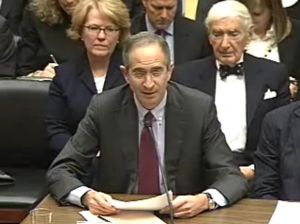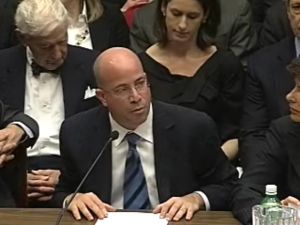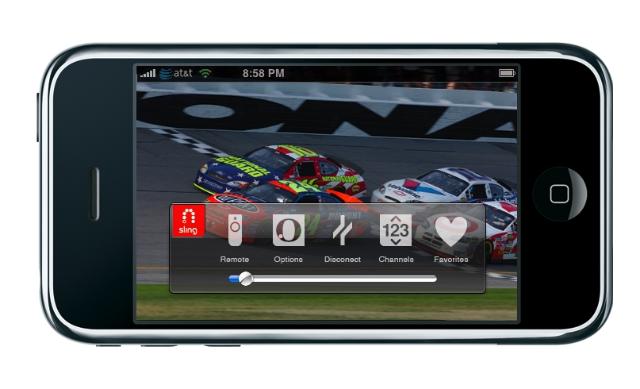By Scott M. Fulton, III, Betanews
 In the end, it was one lone congressman who raised the subject of net neutrality, with respect to access to content over the Internet, as more than a passing reference, or by way of suggesting that certain topics be ignored altogether: Rep. Ed Markey (D - Mass., who also chairs the Energy and Environment Subcommittee), author of the Internet Freedom Preservation Act still being deliberated in Congress, voiced his skepticism over the viability of the proposed acquisition of NBC Universal by a new unit of Comcast, saying he didn't see any guarantees that the current class of over-the-air programming offered by NBC would not be transferred to Comcast pay-TV services such as TV Everywhere.
In the end, it was one lone congressman who raised the subject of net neutrality, with respect to access to content over the Internet, as more than a passing reference, or by way of suggesting that certain topics be ignored altogether: Rep. Ed Markey (D - Mass., who also chairs the Energy and Environment Subcommittee), author of the Internet Freedom Preservation Act still being deliberated in Congress, voiced his skepticism over the viability of the proposed acquisition of NBC Universal by a new unit of Comcast, saying he didn't see any guarantees that the current class of over-the-air programming offered by NBC would not be transferred to Comcast pay-TV services such as TV Everywhere.
But with NBC being the butt end of jokes on TV everywhere, and elsewhere, with respect to its dismal standing in audience ratings and its poor handling of the recent "Tonight Show" reprogramming kerfuffle, the objections raised by Rep. Markey might not have mattered much. In some folks' mind, why would anyone want to pay for NBC shows anyway?
"Clearly the concern here is that when a company that has the wire going into the home merges with a company that has all of NBC Universal's content, there could be a temptation to discriminate against others," stated Rep. Markey, during his Q&A period to a House Telecommunications and the Internet Subcommittee hearing Thursday morning. The subject of the hearing this morning was the Comcast + NBCU deal, among the witnesses were Comcast CEO Brian Roberts, and NBCU CEO Jeff Zucker -- the executive who signed the dotted line on the Jay Leno / Conan O'Brien time change, and subsequently unsigned it.
For his metaphor, Markey chose to imagine the fate of an everyday sci-fi fan who wants to launch some kind of service or blog based on Avatar, but finds himself hampered because the title is owned by 20th Century-Fox. "Going out in the future, we are concerned about the proverbial kid-in-the-garage that's got that great idea. We've got a concern about the kid who thinks up the idea of 'Avatar.com TV.' It could be a big concept, right? And it's not owned by Comcast or NBC. So we have to make sure that it doesn't get discriminated against because it's not an NBC idea, it's not a Comcast idea. So how can we enshrine these principles of non-discrimination against those great new ideas, from having access to the pipes that go into people's homes, that are controlled by Comcast?"

It was perhaps the weakest argument made to date in favor of net neutrality principles in any public hearing to date. But it was the strongest argument in that category today.
Comcast's Brian Roberts appeared perfectly prepared to face much stronger opposition, oftentimes pleading innocence or even no knowledge of the situation where the US #12 cable provider, WOW (formerly WideOpenWest), was denied access to Comcast's existing cable channels (which include E!, the Style Channel, gaming network G4, and sports channel Versus). WOW CEO Colleen Abdoulah was one of only two witnesses who found themselves mounting their own assertive defense, amid the lack of probing from House members. Although Abdoulah admitted not being against the concept of an acquisition or merger on its face, she warned Committee members that a deal could encourage the combined entity to withhold more programming from competitors, including from NBC-owned cable channels CNBC, MSNBC, and Bravo.
And so it was that the net neutrality issue in Congress successfully metamorphosed into a debate over TV viewers' right to see Keith Olbermann, Maria Bartiromo, and Tom Colicchio.
 "I would first want to point out that, whatever you do, if you're really trying to make that protection or achieve that goal, it's going to have to apply across the board," responded Comcast's Roberts to Rep. Markey, "whether that's to all providers, what levels of the Internet, what about wireless? The world is changing and converging and evolving very, very quickly. So again, I believe that this particular transaction doesn't really have the potential, in my opinion, to change that kid in the garage or that 'AvatarTV.com,' or whatever example one wants to pick. Let's just say, Google today is over 50% of all the video views, of the 30 billion views that took place last month."
"I would first want to point out that, whatever you do, if you're really trying to make that protection or achieve that goal, it's going to have to apply across the board," responded Comcast's Roberts to Rep. Markey, "whether that's to all providers, what levels of the Internet, what about wireless? The world is changing and converging and evolving very, very quickly. So again, I believe that this particular transaction doesn't really have the potential, in my opinion, to change that kid in the garage or that 'AvatarTV.com,' or whatever example one wants to pick. Let's just say, Google today is over 50% of all the video views, of the 30 billion views that took place last month."
By comparison, Roberts pointed out earlier, Hulu (co-owned by NBC) had 4% of video views for the same period, NBC itself commanded 1%, and Comcast was responsible for less than one-half of one percent. Although Comcast, by one estimate heard today, is responsible for providing more than 51% of cable service to Americans, its argument is that the combined Internet interests of NBC Universal and Comcast would fail to squeak by 5% of the world's video views, even with the TV Everywhere program going at full steam. Roberts used those figures to illustrate how the proposed combination would constitute the type of horizontal integration that legislators and regulators encourage, as opposed to the type of vertical assimilation of businesses that provide much the same services as each other -- assimilation that typically generates antitrust concerns.
Flanked by his father, Comcast founder Ralph J. Roberts (whom at least two representatives today broke protocol to identify as their personal friend), Brian Roberts promised Rep. Markey that it is not, and will not be, in Comcast's business interests to deny programming to an available carrier. That left Rep. Markey to do little more than praise Roberts, literally for creating a business model that the rest of the world could live by: "Broadband, to a very large extent, is a proxy...for 21st century American competitiveness for the 3% of the population of the world that we represent, and we have to make sure all of that creativity gets unleashed, because that's something we have to brand globally. So that's the conversation that I think we have to have going forward; and this agreement that you have really should be a model to ensure that that becomes who we think of ourselves [to be] as a nation."
Next: But what about Boxee?...
 Committee Chairman Rep. Rick Boucher (D - Va.) turned up at least a few ticks more heat than Rep. Markey, by bringing up the subject of Boxee, the media center software that last spring got into a tangle with Hulu, which is co-owned by NBC. Boxee wanted to be able to show videos provided by Hulu, but its methodology appeared to give Boxee the ability to remove Hulu's advertising.
Committee Chairman Rep. Rick Boucher (D - Va.) turned up at least a few ticks more heat than Rep. Markey, by bringing up the subject of Boxee, the media center software that last spring got into a tangle with Hulu, which is co-owned by NBC. Boxee wanted to be able to show videos provided by Hulu, but its methodology appeared to give Boxee the ability to remove Hulu's advertising.
With NBC effectively getting married to the creator of the TV Everywhere concept, Rep. Boucher asked witnesses, what's to keep the combined entity from denying NBC or Hulu content from Boxee's or anyone else's software? Comcast's Roberts responded with a message that was crafted in a very comforting manner, taking credit for having done no less than invent broadband as we know it, and invent its successor as well.
"We have helped create the broadband experience that consumers enjoy today, some of the work out of CableLABS, going back a decade, was one of the first to create high-speed broadband. It's the fastest-growing part of Comcast, our broadband business," said Roberts. "In fact, we are in the process of completing a nearly $1 billion upgrade to create wideband. And if you say, 'What do you do with wideband?' Right now, I don't have a great answer, except that at 50 or 100 Mbps, I trust there are great entrepreneurs out there to come up with the answers, and we want to be a company on the leading edge...I've said consistently for several years that we believe that video over the Internet is one of those applications that requires more speed, and justifies the investments that we're making in wideband and broadband. We think it is a friend, not a foe."
All that without having to utter the word "Boxee." Boucher then put the question to NBC's Jeff Zucker, representing a co-owner's stake in Hulu. Zucker was more direct in his response, accusing Boxee of not stepping up to the bargaining table.
 "What Boxee was doing was illegally taking the content that was on Hulu without any business deal," Zucker told Congress. "We have several distributors...of the Hulu content that we have legal distribution deals with, so we don't preclude distribution deals. What we preclude are those that illegally take that content." Would NBC be willing to negotiate such a deal with Boxee, Boucher pressed on? "Well, we said that we're open to negotiations."
"What Boxee was doing was illegally taking the content that was on Hulu without any business deal," Zucker told Congress. "We have several distributors...of the Hulu content that we have legal distribution deals with, so we don't preclude distribution deals. What we preclude are those that illegally take that content." Would NBC be willing to negotiate such a deal with Boxee, Boucher pressed on? "Well, we said that we're open to negotiations."
 One of Rep. Henry Waxman's (D - Calif.) perennially key issues has been content protection, and the need to craft digital content to prevent theft and piracy. With NBCU's content being added to the production catalog of Comcast, Rep. Waxman asked Roberts, would Comcast be more compelled to provide more of a leadership role in taking steps to reduce online content theft?
One of Rep. Henry Waxman's (D - Calif.) perennially key issues has been content protection, and the need to craft digital content to prevent theft and piracy. With NBCU's content being added to the production catalog of Comcast, Rep. Waxman asked Roberts, would Comcast be more compelled to provide more of a leadership role in taking steps to reduce online content theft?
"I think we absolutely recognize the vital nature of protecting the licensed, legitimate, non-theft model. It's what's propelled NBC Universal to where it is today, and every owner of content," Roberts responded. "In the distribution business, we also rely on licensed content to be the successful part of our business. So I think we now have double the incentive to figure this issue out, better than it's figured out today. Specifically, I think there have been technological advancements in the last couple of years that are going to make it more likely that we can cooperate...We will now be an active member of NCTA, MPAA, and other industry trade groups that are focused on these questions. I think it's vital that we have a cooperative solution; we obviously, on one hand, have privacy concerns and copyright protection concerns; on the other hand, by having 33,000 employees at NBC Universal that I've got to worry about, and 100,000 employees at Comcast Cable, it's in my interest, and I think the consumer's interest, to continue the licensed model and find solutions that are acceptable."
The strongest opposition to the idea of extending cable-style licensing into the Internet space -- the thing that keeps Boxee from simply showing Hulu in its own window -- came from Dr. Mark Cooper, research director for the Consumer Federation of America. Although Dr. Cooper was advised at least twice to keep his answers short so everyone could move on with things -- Rep. John Dingell (D - Mich.) strictly advised "25 words or less" -- he laid down the only law that anyone was going to lay down today regarding opposition to the deal for ethical reasons.
 "Frankly, we see it as an effort to extend the market division agreement that has existed between cable operators in the physical space, into cyberspace," Cooper told Rep. Dingell. That is the explicit intention of TV Everywhere. The statement that they will not use NBC properties to reinforce that does not answer our concerns, because NBC will stop developing altogether --." At that point, Dingell cut him off.
"Frankly, we see it as an effort to extend the market division agreement that has existed between cable operators in the physical space, into cyberspace," Cooper told Rep. Dingell. That is the explicit intention of TV Everywhere. The statement that they will not use NBC properties to reinforce that does not answer our concerns, because NBC will stop developing altogether --." At that point, Dingell cut him off.
Dingell then asked Roberts, what commitments would Comcast make to prevent the very abuses that Cooper predicted? "Well...we're still 80% a cable company, so our eye is very much still in that perspective...Number two, I don't think the deal changes anything in that regard. NBC has great content and charges the best price that it can get from its customers, and I'm not sure that our incentive is any different, given the two companies coming together. I think that the quality of the content and the technology that's changed in the last several years, is part of the answer, but I think it's a broader industry question, not necessarily specific to this deal."
Earlier in the hearing, Roberts cited statistics saying that in the areas served by WOW cable, Comcast lost 1 million subscribers at the same time WOW gained 7 million -- a sign that competition must be working. But after Roberts' last remark, in an act of grace, Dingell allowed Cooper a "very quick" response, and it was definitely to the point:
"Comcast's sob story about losing cable subscribers is a dog that doesn't hunt," pronounced Dr. Cooper. "In the past few years, they have shifted to triple-play, increased the total number of subscribers that they have across their [portfolio], increased the price of cable, increased the margin on their cable customers. That is inconsistent with a market that is forcing them to lower prices. They are counting the wrong thing -- the thing that they're not really interested in any more."
Copyright Betanews, Inc. 2010









 The world's most widely-used smartphone platform is now completely free and open. Today, the Symbian Foundation announced that the entire 33 million lines of Symbian^3 code is now free under the Eclipse Public License.
The world's most widely-used smartphone platform is now completely free and open. Today, the Symbian Foundation announced that the entire 33 million lines of Symbian^3 code is now free under the Eclipse Public License.




